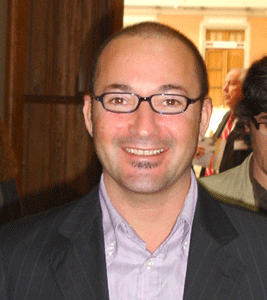Corporate Social Responsibility: How to Integrate and Communicate a Change Management Strategy in Your Organization Towards Sustainability
May 21, 2010 at 10:48 am | Posted in Business and Society, Change Management, Corporate Communications, Corporate Social Responsibility, CSR, European Association of Communication Directors, Rui Martins, Stakeholders | Leave a commentConclusions of the V Regional European Association of Communication Directors (EACD) Lisbon Debate 2010
By Rui Martins
Today the debate around Corporate Social Responsibility focuses on reflections concerning the ends that should orient the exercise of business activity, and thus it’s based on the belief that organizations and society are interconnected and inter-dependent bodies, that must bear in mind legitimate expectations of society towards how business acts and the results it achieves.

Rui Martins, Corporate Communications and Public Affairs Director, Associação Dianova Portugal and Regional Coordinator for Portugal, European Association of Communication Directors
By adopting business policies and practices fitting to the goals and values of society, in search for social benefits that goes beyond economic ones, this volunteer management model implies a business philosophy that is not (or must no longer be) self-centred but incorporates in its planning social and environmental concerns. How can this be achieved? By not only contributing to social development through the profit generated, but also by minimizing any harmful effects over the well-being of communities and society.
Either motivated by a social conscience (ethical motivation), the need of integration (promotion of acceptance) or legitimacy (that legitimizes the capital system) or market pressure (strategic motivation), Corporate Social Responsibility comprises social obligations as the result of the economic, legal and ethical commitments towards society, comprehending, as referred by Carrol (1979, 1999), economic responsibilities (generate wealth and growth), legal responsibilities (binding to legal obligations and norms), ethical responsibilities (synchronized conduct with moral codes and social values) and philanthropic responsibilities (contributing on an active and volunteer basis to the resolution of social problems and improvement of quality of life).
It seems clear that the adoption of more rigorous control mechanisms with regard to the social, environmental and ethical impact of business activity—including management decisions that affect health, security and well-being of consumers, employees and communities (to mention just a few stakeholders)—and an investment in a more transparent relationship and engagement with society, is in order.
There is likewise a need for a revaluation of business as moral, questioning the traditional, egocentric view of business that unnecessarily divides individual well-being from collective well-being—a view that in turn threatens both the system and business sustainability.
The recent financial and economic crisis hopefully has taught us a critical lesson: it is time, as Filipe Almeida has said, for “a more socially responsible business management that provides an adequate answer to the economic, legal and ethical commitments that bind businesses to society.” The adoption of this type of management model will generate competitive advantages, such as corporate reputation.
Corporate reputation’s mission is to create value for stakeholders—clients, boards of directors, employees and the broader society—by building a trustworthy and inspiring brand that guarantees organizational sustainability. The roadmap to achieving a sustainable brand is determined by how leadership responds to the three basic questions:
- What procedures and capabilities do we require?
- What do we need to change?
- How can we best manage change in harmony with our core values?
By linking business strategy with communications in the first place, we can recreate and lead an organization’s future—starting with the alignment of people, leadership and organisational culture—through a change management process that comprehends four levels of communication. These four levels of communication—awareness, understanding, commitment and change—are best engaged by using a proactive and positive flow of information, dialog, involvement and recognition with the most suitable offline and online tools.
This was the main focus of the V Regional EACD Lisbon Debate held on May 10, 2010 in Lisbon, Portugal. The session, “Corporate Social Responsibility: a multistakeholders’ approach to Sustainability in times of turmoil,” sponsored by CTT made an important contribution to the present dialog on this topic which is of critical importance to both business and society.
Luís Paulo, Sustainability Director of CTT, delivering a presentation on “The Limits of Sustainability” in which he raised the question of whether corporate sustainability will save the planet or is it just another fad? Or is it even worse, a smokescreen for BwU – Business worse than Usual? Mr. Paulo outlined CTT’s commitment to sustainability, which he argued not only benefits society but provides CTT with a competitive edge.
+ Presentation: http://www.slideshare.net/Dianova/luis-paulo-os-limites-da-sustentabilidade-eacd-lisboa-2010
Lara Campos Tropa, Workforce & Field Enablement in Marketing, Communications and Citizenship Responsibility at IBM Portugal, demonstrated how IBM is measuring and evaluating CSR. Based on IBM’s corporate citizenship programme, Lara Campos Tropa focused on the way a small part of a global company can manage, measure and evaluate its locally developed CSR programmes such as the World Community Grid, KidSmart, TryScience or the Corporate Service Corps.
Yannis Freris, Head of Corporate Communication & Sustainable Development at Gefyra, and Head of CSR Working Group at European Association of Communication Directors, delivered a presentation titled “Make Acts not Words” which focused on the era of the “eco2soc crises” (economic and ecological crises, with their social outcomes). The crisis, he said, is one more reason for corporate communications to show its “eco2soc consciousness” to the community. Yannis explained how an organisation can position itself as a real citizen through its actions.
+ Presentation: http://www.slideshare.net/Dianova/yannis-freris-v-regional-eacd-lisbon-debate-2010
You can also see the evaluation presentation through the link: http://www.slideshare.net/Dianova/eacd-v-regional-lisbon-debate-may-evaluation-2010
——————————————
About Rui Martins
Rui Martins is Corporate Communications and Public Affairs Director for Associação Dianova Portugal and Regional Coordinator for Portugal for the European Association of Communication Directors.
Leave a Comment »
Authors
-
Join 9 other subscribers
Blog at WordPress.com.
Entries and comments feeds.
Leave a comment